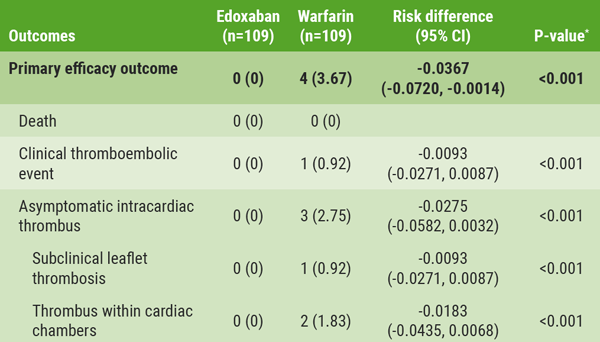Mavacamten is a first-in-class, selective allosteric inhibitor of cardiac myosin, which reduces the number of myosin-actin cross bridges and decreases the excessive contractility that characterises hypertrophic cardiomyopathy. The MAVERICK-HCM study analysed 59 patients with symptomatic non-obstructive hypertrophic cardiomyopathy. After a 28-day screening period, patients were assigned to either once-daily mavacamten with a drug concentration target of 200 ng/mL (n=19), once-daily mavacamten with a drug concentration target of 500 ng/mL (n=21), or once-daily placebo (n=19). Patients were treated during a period of 16 weeks, followed by monitoring for 8 weeks after completion.
During treatment and wash-out (to 24 weeks), 89.7% of patients who received mavacamten had ≥1 treatment-emergent adverse event –76% had mild adverse events– versus 68.4% of patients on placebo. Furthermore, 10.3% of mavacamten patients had ≥1 serious adverse event versus 21.1% with placebo. Mean reduction in left ventricular ejection fraction from baseline to 16 weeks in the pooled mavacamten group was -4.1%. This was -2.3% for patients receiving 200 ng/mL mavacamten, -5.6% for those on 500 ng/mL mavacamten, and -2.3% for placebo. In addition, mavacamten reduced N-terminal pro-brain natriuretic peptide (NT-proBNP) by 53% compared with 1% with placebo (P=0.0005). The drug also decreased cardiac troponin I by 34% versus a 4% increase with placebo (P=0.009). The change in NT-proBNP at 4 weeks in patients assigned mavacamten correlated with the change in cardiac troponin I at 16 weeks (P=0.006). Dr Ho pointed out that patients with more severe disease may derive a greater benefit from treatment with mavacamten. The MAVERICK-HCM results set the groundwork for future larger-scale studies in non-obstructive hypertrophic cardiomyopathy and potentially heart failure with preserved ejection fraction.
- Ho CY, et al. Abstract 412-16. ACC/WCC 28-30 March 2020.
Posted on
Previous Article
« Sacubitril-valsartan in hospitalized HF patients could have benefits Next Article
DNA-methylation test shows promise in bladder-cancer detection, monitoring »
« Sacubitril-valsartan in hospitalized HF patients could have benefits Next Article
DNA-methylation test shows promise in bladder-cancer detection, monitoring »
Table of Contents: ACC/WCC 2020
Featured articles
Heart Failure and Cardiomyopathies
Mavacamten shows promising results in non-obstructive hypertrophic cardiomyopathy
Vericiguat shows beneficial effects in a very high-risk HF population
No role for sodium nitrite in out-of-hospital cardiac arrest
Vascular Medicine and Thromboembolism
Rivaroxaban and aspirin effective and safe for PAD patients
TAILOR-PCI misses endpoint but still provides valuable insights
Edoxaban: alternative to warfarin after surgical aortic or mitral valve procedures?
Bleeding reduction post-TAVI with OAC alone vs OAC + clopidogrel
Apixaban offers new perspective for cancer patients in need of anticoagulation
Rivaroxaban superior to enoxaparin in preventing VTE in non-major orthopaedic surgery
Interventional Cardiology
TAVR safe and effective in low-risk bicuspid aortic stenosis patients
TAVR model reveals differences in hospital outcomes
2-year results show non-significant outcomes TAVR vs surgery in severe aortic stenosis
Renal denervation better than sham for blood pressure
Infusion of ethanol in the vein of Marshall for persistent AF
Atrial Fibrillation/Acute Coronary Syndrome
Fewer adverse events with ticagrelor monotherapy after 3 months DAPT
TWILIGHT sub-study: same outcomes for diabetes patients
TWILIGHT sub-study: complex PCI patients
LAAO Watchman registry data positive
Apixaban in AF patients with recent ACS/PCI: Drop aspirin after 30 days
Genetics and Prevention
Homozygous FH responds to alirocumab
Evinacumab significantly reduces LDL-C in homozygous FH patients
Higher serum levels of eicosapentaenoic acid correlate with reduced CV events
Quit smoking: vaping + counselling helps
Related Articles
September 8, 2020
Infusion of ethanol in the vein of Marshall for persistent AF


© 2024 Medicom Medical Publishers. All rights reserved. Terms and Conditions | Privacy Policy
HEAD OFFICE
Laarderhoogtweg 25
1101 EB Amsterdam
The Netherlands
T: +31 85 4012 560
E: publishers@medicom-publishers.com

